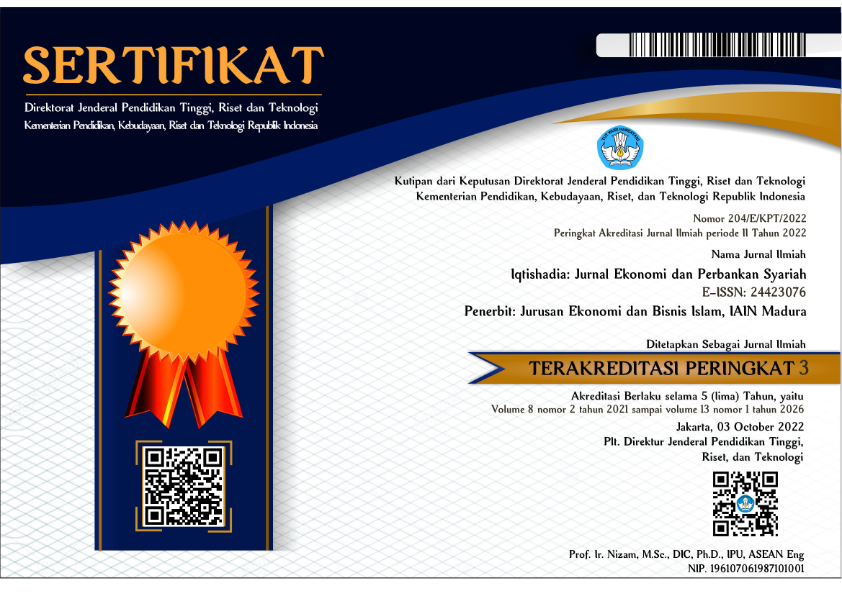Minat Masyarakat Kota Mataram Berwakaf Uang: Sikap Sebagai Variabel Mediasi
 Abstract views: 83
,
Abstract views: 83
,
 PDF downloads: 93
PDF downloads: 93
Abstract
This study aims to analyze the factors influencing the interest of society to cash waqf in Mataram City. This research uses a quantitative approach. The population of this study is unknown, so sampling uses a purposive sampling. The number of samples was 100 respondents taken based on the Lemeshow formula. The data used is primary data from the questionnaires. This study uses data analysis with the Structure Equation Model-Partial Least Square (SEM-PLS). The results showed that subjective norms have a positive but insignificant effect on the attitude to cash waqf. Religiosity and knowledge have a positive and significant effect on the attitude to cash waqf. Subjective norms and knowledge have a positive and significant effect on the interest in cash waqf. Religiosity and attitude have a positive but insignificant effect on interest in cash waqf. Subjective norms, religiosity and knowledge have a positive but insignificant effect on interest in cash waqf mediated by attitudes. The Adjusted R-Square value is 0.513 or 51.3 per cent, meaning that the variables of subjective norms, religiosity, knowledge and attitudes are able to explain the variation in the variable interest in waqf money by 51.3 percent which is classified as a moderate model.
Downloads
References
Abd Mutalib, H., Muhamad Noor, S., Nasirun, N., Harun, R., & Mohd Abdoh, W. M. Y. (2019). Factors Influencing Waqf Participation Among Muslims: The Moderating Role of Attitude. In Proceedings of the Second International Conference on the Future of ASEAN (ICoFA) 2017 - Volume 1. https://doi.org/10.1007/978-981-10-8730-1_50
Adistii, D., Susilowati, D., & Ulfah, P. (2021). Peran Akuntabilitas sebagai Moderasi Hubungan Religiusitas dan Literasi Wakaf terhadap Minat Berwakaf Uang. Reviu Akuntansi Dan Bisnis Indonesia, 5(2). https://doi.org/10.18196/rabin.v5i2.12238
Afandi, A., Harahap, D., & Lubis, M. (2022). Analisis Faktor-Faktor Yang Mempengaruhi Minat Wakif Dalam Berwakaf Pada Cash Waqf Linked Sukuk (CWLS) Dengan Altruisme Sebagai Variabel Moderasi. Al-Awqaf: Jurnal Wakaf Dan Ekonomi Islam, 15(1). https://doi.org/10.47411/al-awqaf.vol15iss1.161
Aji, H. M., Albari, A., Muthohar, M., Sumadi, S., Sigit, M., Muslichah, I., & Hidayat, A. (2021). Investigating the determinants of online infaq intention during the COVID-19 pandemic: an insight from Indonesia. Journal of Islamic Accounting and Business Research, 12(1). https://doi.org/10.1108/JIABR-05-2020-0136
Ajzen, I. (1991). The Theory of Planned Behaviour, Organizational Behavior and Human Decision Processes 50, 179-211 (1991). Disability, CBR and Inclusive Development, 33(1).
Ajzen, I. (2015). Attitude, Personality and Behaviour, 2nd Edition. In Open University Press.
Ajzen, I., & Fishbein, M. (1969). The prediction of behavioral intentions in a choice situation. Journal of Experimental Social Psychology, 5(4). https://doi.org/10.1016/0022-1031(69)90033-X
Albaity, M., & Rahman, M. (2019). The intention to use Islamic banking: an exploratory study to measure Islamic financial literacy. International Journal of Emerging Markets, 14(5). https://doi.org/10.1108/IJOEM-05-2018-0218
Bananuka, J., Kaawaase, T. K., Kasera, M., & Nalukenge, I. (2019). Determinants of the intention to adopt Islamic banking in a non-Islamic developing country: The case of Uganda. ISRA International Journal of Islamic Finance, 11(2). https://doi.org/10.1108/IJIF-04-2018-0040
Bassir, N. F., Zakaria, Z., Hasan, H. A., & Alfan, E. (2014). Factors influencing the adoption of Islamic home financing in Malaysia. Transformations in Business and Economics, 13(1).
Budiansyah, M. I., & Ayyubi, S. El. (2021). Faktor-Faktor Yang Memengaruhi Wakif Dalam Berwakaf Online. Al Maal: Journal of Islamic Economics and Banking, 2(2). https://doi.org/10.31000/almaal.v2i2.3741
Carabain, C. L., & Bekkers, R. (2011). Religious and secular volunteering: a comparison between immigrants and non-immigrants in the Netherlands. Voluntary Sector Review, 2(1). https://doi.org/10.1332/204080511x560602
Charag, A. H., Fazili, A. I., & Bashir, I. (2020). Determinants of consumer’s readiness to adopt Islamic banking in Kashmir. Journal of Islamic Marketing, 11(5). https://doi.org/10.1108/JIMA-10-2018-0182
Chrisna, H., Noviani, & Hernawaty. (2021). Faktor - Faktor Yang Mempengaruhi Minat Berwakaf Tunai Pada Jamaah Majelis Taklim Istiqomah Kelurahan Tanjung Sari Medan. Jurnal Akuntansi Bisnis & Publik, 11(2).
Hasanah, N. (2018). KONTEKSTUALITAS AYAT-AYAT HUKUM WAKAF DI INDONESIA. Asy-Syari’ah, 20(2). https://doi.org/10.15575/as.v20i2.3446
Hasanah, N., & Maha. (2022). Wakaf Uang: Pengaruh Kognisi, Religiusitas, Danpersepsi Kemudahan Terhadap Minat Berwakaf. QIEMA (Qomaruddin Islamic Economy Magazine), 8(2).
Imam, N., & Huda, N. (2022). Faktor-Faktor yang Mempengaruhi Masyarakat Berwakaf Uang di Dompet Dhuafa. Al-Awqaf: Jurnal Wakaf Dan Ekonomi Islam, 15(2). https://doi.org/10.47411/al-awqaf.vol15iss2.174
Johnson, B. R., Larson, D. B., De Li, S., & Jang, S. J. (2000). Escaping from the crime of inner cities: Church attendance and religious salience among disadvantaged youth. Justice Quarterly, 17(2). https://doi.org/10.1080/07418820000096371
Kaakeh, A., Hassan, M. K., & van Hemmen Almazor, S. F. (2018). Attitude of Muslim minority in Spain towards Islamic finance. International Journal of Islamic and Middle Eastern Finance and Management, 11(2). https://doi.org/10.1108/IMEFM-11-2017-0306
Kasri, R. A. (2013). Giving behaviors in Indonesia: Motives and marketing implications for Islamic charities. Journal of Islamic Marketing, 4(3). https://doi.org/10.1108/JIMA-05-2011-0044
Kasri, R. A., & Chaerunnisa, S. R. (2022). The role of knowledge, trust, and religiosity in explaining the online cash waqf amongst Muslim millennials. Journal of Islamic Marketing, 13(6). https://doi.org/10.1108/JIMA-04-2020-0101
Kasri, R. A., & Ramli, U. H. (2019). Why do Indonesian Muslims donate through mosques? International Journal of Islamic and Middle Eastern Finance and Management, 12(5). https://doi.org/10.1108/imefm-11-2018-0399
Kurniawati, D., Zainuddin, C., & Lidyah, R. (2021). Pengaruh Religiusitas dan Fundraising terhadap Minat Berwakaf Uang dengan Kesadaran Sebagai Variabel Intervening pada Pegawai Kantor Wilayah Kementerian Agama Provinsi Sumatera Selatan. Jurnal Intelektualita: Keislaman, Sosial Dan Sains, 10(1). https://doi.org/10.19109/intelektualita.v10i1.8607
Latif, A., Lesmana, M., Ahmad, R. A., & Julian, A. (2022). STUDENT CONTRIBUTIONS IN WAQF ARE REVIEWED THROUGH FACTORS OF RELIGIOSITY, KNOWLEDGE, AND FINANCIAL ATTITUDES. FINANSIA : Jurnal Akuntansi Dan Perbankan Syariah, 5(2). https://doi.org/10.32332/finansia.v5i2.5394
Mahendra, D., M Nawawi, Z., & Imsar. (2022). PENGARUH RELIGIUSITAS DAN PENGETAHUAN TERHADAP PERILAKU BERWAKAF UANG. Jurnal Tabarru’: Islamic Banking and Finance, 5(1). https://doi.org/10.25299/jtb.2022.vol5(1).9255
Maivalinda, M., Srihasnita, R., & Firsta, F. (2021). Mengukur Minat Wakaf Uang Generasi Milenial dalam Mendukung Pendanaan Pembangunan Berkelanjutan Sumatera Barat. Jurnal Ekonomi Dan Bisnis Dharma Andalas, 23(1). https://doi.org/10.47233/jebd.v23i1.175
Maziah, U., & Widyastuti, E. (2021). Analisis Faktor-Faktor Yang Mempengaruhi Minat Generasi Milenial Dalam Berwakaf Tunai. Jurnal Ekonomi Syariah Dan Filantropi Islam, 5(2).
Mudrikah, S. (2021). Determinan terhadap Niat Membayar Wakaf Uang. El-Buhuth: Borneo Journal of Islamic Studies. https://doi.org/10.21093/el-buhuth.v4i1.3730
Noviati Sadikin, P., Mulatsih, S., Pramudya Noorachmat, B., & Susilo Arifin, H. (2017). ANALISIS WILLINGNESS-TO-PAY PADA EKOWISATA TAMAN NASIONAL GUNUNG RINJANI. Jurnal Analisis Kebijakan Kehutanan, 14(1). https://doi.org/10.20886/jakk.2017.14.1.31-46
Othman, Y. H.-, Alwi, I., Yusuff, M. S. S., & Saufi, M. S. A. M. (2017). The Influence of Attitude, Subjective Norm, and Islamic Religiosity on Compliance Behavior of Income Zakat Among Educators. International Journal of Academic Research in Business and Social Sciences, 7(11). https://doi.org/10.6007/ijarbss/v7-i11/3549
Rahmania, N., & Maulana, H. (2023). Waqf Literacy Level and Its Determinants on Public Intention to Contribute Cash Waqf: a Study of Waqf Institutions in Indonesian. IQTISHODUNA: Jurnal Ekonomi Islam, 12(1). https://doi.org/10.54471/iqtishoduna.v12i1.1963
Rozalinda. (2016). Management Waqf Produktif Di Sumatera Barat. In Al-Awqaf: Jurnal Wakaf dan Ekonomi Islam (Vol. 9).
Salem Al-Harethi, A. R. (2019). Factors Determine Cash Waqf Participation in Kedah, Malaysia: Perception from Students in Kolej University Insaniah. IKONOMIKA, 4(1). https://doi.org/10.24042/febi.v4i1.3927
Shahijan, M. K., Preece, C. N., Rezaei, S., & Ismail, W. K. W. (2014). Examining retailers’ behaviour in managing critical points in Halal meat handling: A PLS analysis. Journal of Islamic Marketing, 5(3). https://doi.org/10.1108/JIMA-10-2013-0070
Souiden, N., & Rani, M. (2015). Consumer attitudes and purchase intentions toward Islamic banks: The influence of religiosity. International Journal of Bank Marketing, 33(2). https://doi.org/10.1108/IJBM-10-2013-0115
Sugiyono. (2013). Metode Penelitian Pendidikan Pendekatan Kuantitaif, Kualitatif, dan R&DSugiyono. 2013. “Metode Penelitian Pendidikan Pendekatan Kuantitaif, Kualitatif, dan R&D.” Metode Penelitian Pendidikan Pendekatan Kuantitaif, Kualitatif, dan R&D. https://doi.org/10.1. Metode Penelitian Pendidikan Pendekatan Kuantitaif, Kualitatif, Dan R&D.
Sugiyono. (2018). Sugiyono Metode Penelitian Kuantitatif Kualitatif. Metode Penelitian Kuantitatif Kualitatif.
Witjaksono, B., Mariyanti, T., Nasution, M. E., Huda, N., & Rini, N. (2019a). Factors Which Influence the Intention of Community in Cash Waqaf in Sharia Banking with Theory Planned Behaviour (TPB) Modification Approach. Journal of Islamic Banking and Finance, 7(2).
Witjaksono, B., Mariyanti, T., Nasution, M. E., Huda, N., & Rini, N. (2019b). Factors Which Influence the Intention of Community in Cash Waqaf in Sharia Banking with Theory Planned Behaviour (TPB) Modification Approach. Journal of Islamic Banking and Finance, 7(2).
Yulianti, D. (2021). Pengaruh Pengetahuan, Tingkat Pendapatan, dan Tingkat Pendidikan Terhadap Minat Masyarakat Berwakaf Uang. Al-Awqaf: Jurnal Wakaf Dan Ekonomi Islam, 13(2). https://doi.org/10.47411/al-awqaf.v13i2.131
The journal operates an Open Access policy under a Creative Commons Non-Commercial Share-Alike license. All articles published Open Access will be immediately and permanently free for everyone to read and download.
• Creative Commons Attribution-NonCommercial (CC-BY-NC)

Iqtishadia: Jurnal Ekonomi dan Perbankan Syariah by http://ejournal.iainmadura.ac.id/index.php/iqtishadia is licensed under a Creative Commons Attribution-NonCommercial 4.0 International License.
Based on a work at http://ejournal.iainmadura.ac.id.
























